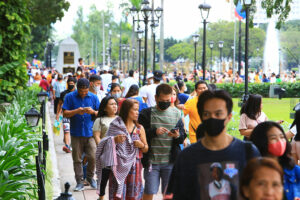NEARLY two-thirds of Filipinos view Philippine democracy as flawed, indicating concerns over the government’s integrity, according to a recent poll by the Philippine Observatory on Democracy.
Around 64% of Filipinos in urban areas see the country’s democracy as a “democracy with problems,” citing issues like corruption, perceived lack of integrity among leaders, and bureaucratic red tape, said Philip Arnold P. Tuaño, dean of the Ateneo School of Government, who presented the survey’s findings on Tuesday.
The Philippine Observatory on Democracy conducted face-to-face interviews with 842 respondents, aged 18 years old and above, in key urban areas: Metro Manila, Naga City, Cebu City, Cagayan de Oro, Davao City, and Zamboanga, from Dec. 2 to 21 last year. It has an error margin of ±5.2 points.
Around 27% said Philippine democracy has a minor problem, while 37% said it has major issues. “These perceived problems with Philippine democracy underscored deep-seated anxieties about the integrity of the government and its trustworthiness — two pillars for democratic legitimacy,” he said.
Only 20% of Filipinos consider Philippine democracy as a “full” democracy,” while 4% said it is not a democracy at all. It also revealed that one in ten Filipinos admitted to not understanding democracy.
The Philippines is often regarded as Southeast Asia’s oldest democracy, having adopted democratic practices from the US early in the 20th century. Philippine democracy was disrupted in 1972 when the late dictator Ferdinand E. Marcos declared martial law, but it was restored 14 years later.
Democracy remains the most preferred type of government with around 41% of Filipinos supporting a democratic style of governance over authoritarianism. However, a significant share of urban Filipinos (37%) said they do not care whether the government is democratic or authoritarian.
Almost 20% said they favor authoritarian governance under specific conditions, while the remaining 3% said the question was unclear.
“These findings point to a weakening attachment to democracy among urban Filipinos,” said Mr. Tuaño. “It also confirms findings in other studies in Asia that there is high general support for democracy as the best form of government, but a low commitment to it when it competes with economic priorities.”
The Marcos administration faces unresolved economic challenges, including inflation, which may have influenced Filipinos’ perception of democracy as flawed, said Robin Michael U. Garcia, founder of WR Numero Research.
“There are still persisting problems… in terms of economic output. The Marcos administration has a lot of economic problems, and chief among them is actually inflation.”
Inflation eased to its lowest annual rate in nearly five years in March, as food and transport costs rose at a slower pace.
Inflation averaged at 2.2% for the first quarter of 2025, well within the Philippine central bank’s 2-4% target. March data showed the consumer price index rose to 1.8%, easing from 2.1% in February and 3.7% a year ago. — Kenneth Christiane L. Basilio
